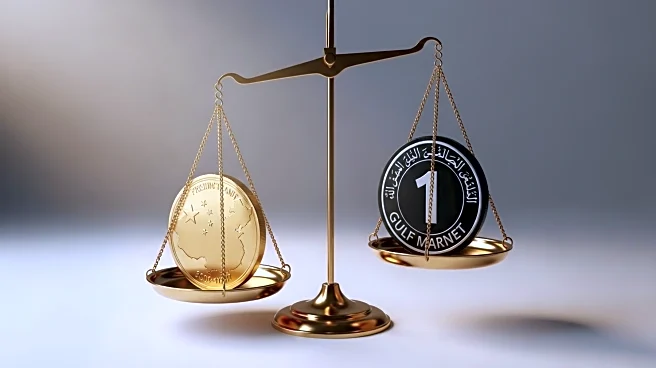What's Happening?
Most stock markets in the Gulf ended lower following President Trump's announcement of a 100% tariff increase on Chinese exports to the U.S. This decision was made in response to China's recent restrictions on rare earth mineral exports, which are crucial for technology and other industries. The Saudi Arabian benchmark index TASI fell by 0.8%, influenced by declines in major companies such as Al Rajhi Bank and Saudi Aramco. Additionally, Saudi Arabia's crude oil exports to China are expected to decrease in November, as refiners opt for cheaper supplies from other Middle Eastern producers. In Qatar, the GNRI index dropped by 0.9%, with Qatar Islamic Bank experiencing a significant decline. The announcement also affected Brent and U.S. crude futures, which fell by more than $2 a barrel, reflecting concerns over demand in an oversupplied market.
Why It's Important?
The tariff increase by President Trump is significant as it escalates trade tensions between the U.S. and China, potentially impacting global economic stability. The Gulf region, heavily reliant on oil exports, faces challenges as crude prices drop and demand outlooks become uncertain. This situation could lead to economic repercussions for countries like Saudi Arabia and Qatar, which depend on oil revenues. The broader implications include potential shifts in trade alliances and supply chain adjustments, as countries seek alternative sources for critical minerals and cheaper oil supplies. The move also highlights the interconnectedness of global markets, where policy changes in one region can have ripple effects across others.
What's Next?
The foreseeable consequences of President Trump's tariff increase include potential retaliatory measures from China, which could further strain trade relations. Gulf countries may need to reassess their export strategies and explore new markets to mitigate the impact of reduced oil exports to China. Additionally, businesses and industries reliant on rare earth minerals may face increased costs and supply chain disruptions, prompting them to seek alternative sources or invest in domestic production capabilities. Stakeholders, including political leaders and industry groups, are likely to engage in discussions to address these challenges and explore diplomatic solutions to ease trade tensions.
Beyond the Headlines
The tariff increase raises ethical and legal questions about the use of trade policy as a tool for geopolitical leverage. It also underscores the vulnerability of industries dependent on specific resources, highlighting the need for diversification and innovation in sourcing materials. Long-term shifts may include increased investment in renewable energy and technology sectors, as countries seek to reduce reliance on imports and enhance self-sufficiency. The situation may also prompt discussions on international trade regulations and the role of multilateral organizations in mediating disputes.









